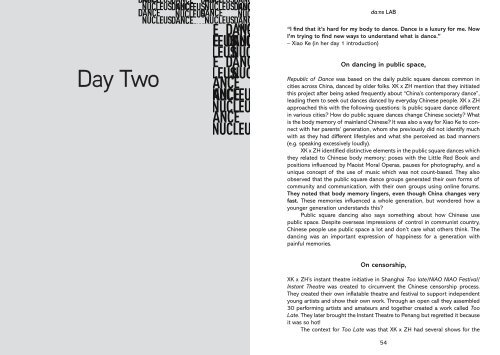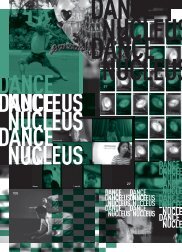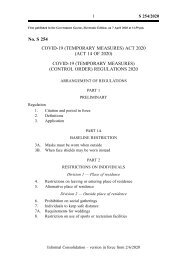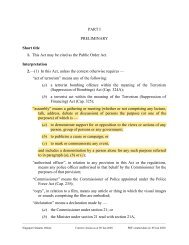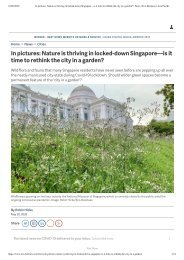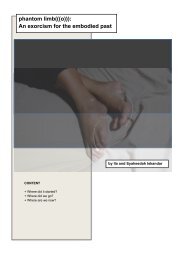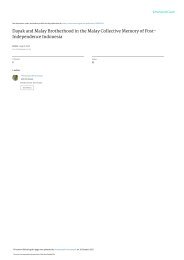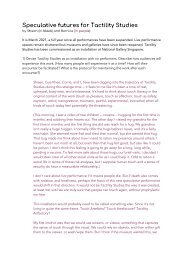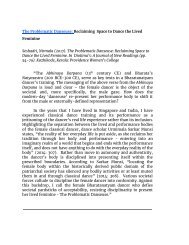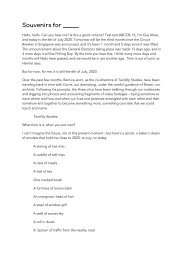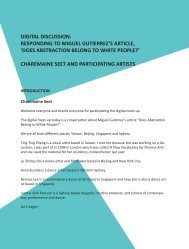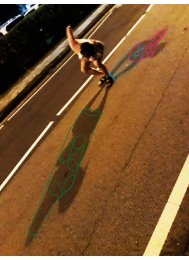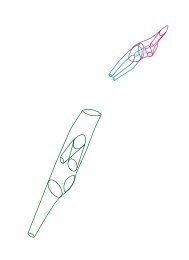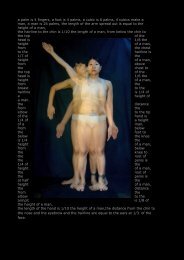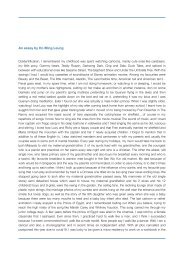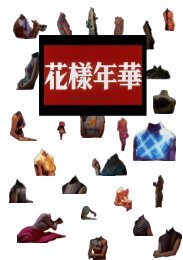FUSE#4
FUSE is a bi-annual publication that documents the projects at Dance Nucleus .
FUSE is a bi-annual publication that documents the projects at Dance Nucleus .
You also want an ePaper? Increase the reach of your titles
YUMPU automatically turns print PDFs into web optimized ePapers that Google loves.
da:ns LAB<br />
“I find that it’s hard for my body to dance. Dance is a luxury for me. Now<br />
I’m trying to find new ways to understand what is dance.”<br />
– Xiao Ke (in her day 1 introduction)<br />
Day Two<br />
On dancing in public space,<br />
Republic of Dance was based on the daily public square dances common in<br />
cities across China, danced by older folks. XK x ZH mention that they initiated<br />
this project after being asked frequently about “China’s contemporary dance”,<br />
leading them to seek out dances danced by everyday Chinese people. XK x ZH<br />
approached this with the following questions: Is public square dance different<br />
in various cities? How do public square dances change Chinese society? What<br />
is the body memory of mainland Chinese? It was also a way for Xiao Ke to connect<br />
with her parents’ generation, whom she previously did not identify much<br />
with as they had different lifestyles and what she perceived as bad manners<br />
(e.g. speaking excessively loudly).<br />
XK x ZH identified distinctive elements in the public square dances which<br />
they related to Chinese body memory: poses with the Little Red Book and<br />
positions influenced by Maoist Moral Operas, pauses for photography, and a<br />
unique concept of the use of music which was not count-based. They also<br />
observed that the public square dance groups generated their own forms of<br />
community and communication, with their own groups using online forums.<br />
They noted that body memory lingers, even though China changes very<br />
fast. These memories influenced a whole generation, but wondered how a<br />
younger generation understands this?<br />
Public square dancing also says something about how Chinese use<br />
public space. Despite overseas impressions of control in communist country,<br />
Chinese people use public space a lot and don’t care what others think. The<br />
dancing was an important expression of happiness for a generation with<br />
painful memories.<br />
On censorship,<br />
XK x ZH’s instant theatre initiative in Shanghai Too late/NIAO NIAO Festival/<br />
Instant Theatre was created to circumvent the Chinese censorship process.<br />
They created their own inflatable theatre and festival to support independent<br />
young artists and show their own work. Through an open call they assembled<br />
30 performing artists and amateurs and together created a work called Too<br />
Late. They later brought the Instant Theatre to Penang but regretted it because<br />
it was so hot!<br />
The context for Too Late was that XK x ZH had several shows for the<br />
54


